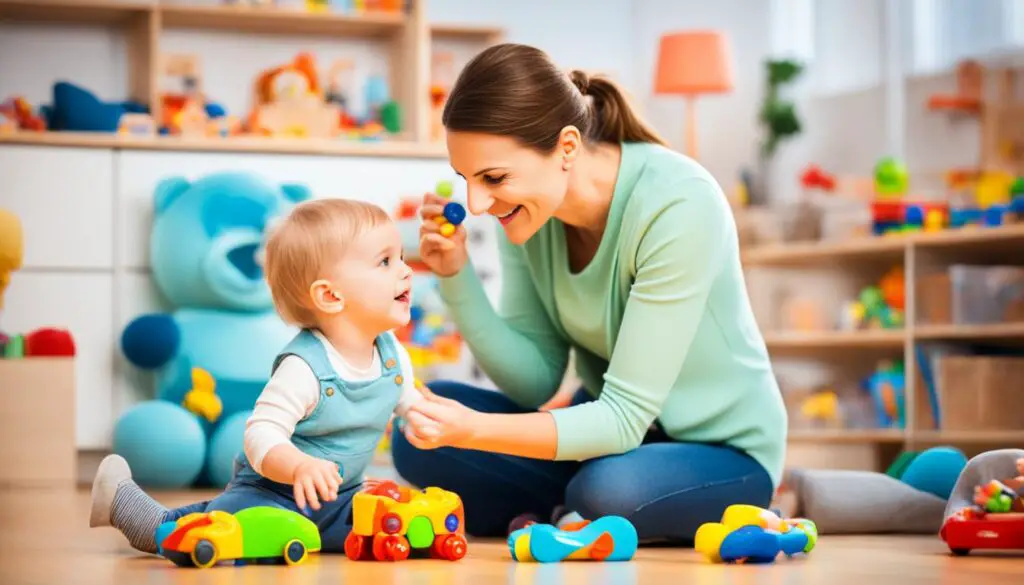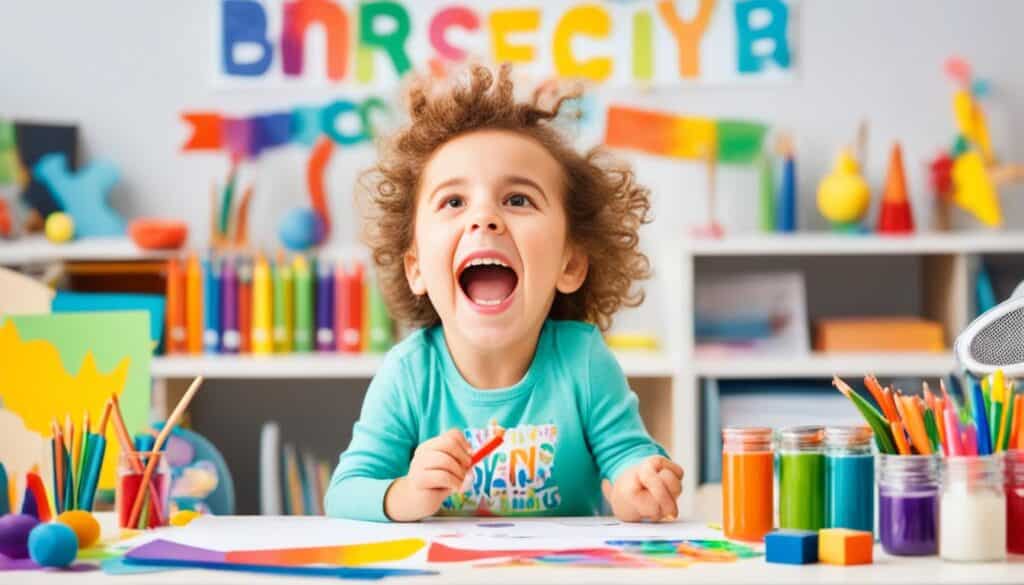Embarking on the journey of parenthood can feel like navigating an unfathomable sea of responsibilities, emotions, and uncharted territories. Taking the helm with effective parenting techniques, however, can set a course for a rewarding voyage that fosters the growth of well-adjusted and happy children. At the core of this journey lies the art of nurturing parenting—a process that shapes not just the child, but the parent as well. It is a continuous evolution underscored by the commitment to learn, adapt, and apply child-rearing best practices that resonate with your family’s dynamics. In this era of abundant information and resources, one should be ever-mindful of the bonds we create and the life lessons we instill, assured that our efforts today will become the fabric of our children’s tomorrow.
As the family tree grows, so do the challenges of keeping its branches healthy and strong. Good parenting is less about perfection and more about presence, less about dictating each step and more about guiding with a gentle hand. The coming sections will outline methods to establish trust, communication, and a nurturing environment, every step taken to ensure your child has the best possible start in life.
Key Takeaways
- Embrace nurturing parenting as a way to cultivate strong family bonds and happy, confident children.
- Learn and grow with your children by regularly integrating effective parenting techniques into your daily interactions.
- Understand that parenting is a journey of learning, where making mistakes is part of developing child-rearing best practices.
- Foster an environment that prioritizes the overall wellness and emotional development of your child.
- Balance guidance with independence to nurture self-reliance and confidence in your child’s abilities.
- Always prioritize open communication, reinforcing trust and understanding at every stage of your child’s growth.
- Remember that your role is as much about facilitating discovery as it is about protecting and educating.
Understanding Your Child’s Developmental Needs
Grasping the intricacies of a child’s growth is a daunting yet essential part of parenting. Knowledge about child development and the variety of developmental stages is crucial to provide the best care and guidance. With this insight, parents can foster environments that promote not only cognitive development but also vital emotional intelligence in children. Monitoring and encouraging physical milestones is equally important to ensure children thrive. Let’s delve into the heart of what it means to support your child’s developmental journey.
The Importance of Age-Appropriate Expectations
Setting expectations that align with a child’s age is a foundational aspect of effective parenting. It helps in recognizing and nurturing a child’s ability to learn and adapt at each stage of their life. Age-appropriate expectations allow children to achieve success at a pace that’s right for them, which is immensely beneficial for both their confidence and autonomy.
Fostering Emotional Growth and Intelligence
Encouraging emotional intelligence in children is about more than just recognizing feelings. It involves teaching them to understand and manage emotions—both their own and those of others. This understanding creates a solid foundation for interpersonal skills and emotional well-being that lasts a lifetime.
Supporting Physical and Cognitive Milestones
As children grow, they reach significant physical milestones, such as walking, climbing, or riding a bike. These milestones mark not just physical abilities but also advancements in cognitive development. As children learn to navigate their environments, they also develop problem-solving skills, memory, and creative thinking.
Recognizing and meeting your child’s needs at each developmental stage requires patience and attentiveness. By providing the necessary support, parents play an active role in helping their children traverse the path of development with confidence and assurance in their growing abilities.
Creating a Nurturing Home Environment
Establishing a nurturing environment within your home is essential for encouraging the holistic growth of children. A stable and loving atmosphere forms the bedrock upon which all other aspects of parenting can flourish. As parents, fostering this environment requires a careful blend of compassion, structure, and ongoing dialogue. This section breaks down the key components of such an environment and offers guidance for integrating these principles into daily family life.

Building a Foundation of Unconditional Love
Laying the groundwork for a nurturing environment begins with a strong foundation of unconditional love. This establishes a stable base upon which children can develop into secure and confident individuals. Reminding your children through actions and words that your love does not hinge on their achievements or behavior, but is instead a steadfast constant, is paramount in fostering a healthy and supportive home life.
Setting Boundaries and Consistent Routines
While it is important to provide an environment filled with warmth, setting boundaries for children is equally essential in developing a sense of security and structure. These boundaries help to cultivate discipline, self-control, and an understanding of expectations. Family routines play a critical role here, offering predictability that many children find reassuring. Ensuring that these routines align with your family’s values and needs is key to their success.
| Boundary | Benefit | Routine Example |
|---|---|---|
| Limited Screen Time | Encourages Creativity & Outside Play | Family Game Night on Wednesdays |
| Regular Bedtimes | Supports Healthy Sleep Patterns | Story Time Before Bed |
| Homework Before Play | Promotes Responsibility & Work Ethic | Study Hour After School |
| Chores | Teaches Life Skills & Teamwork | Saturday Morning Family Clean-Up |
Encouraging Open Communication and Trust
Creating a climate of open communication and trust is a cornerstone of a nurturing home. It paves the way for heartfelt conversations and supports children in sharing their thoughts and feelings without fear of judgment or reprisal. Emphasized through daily interactions, open communication fosters mutual understanding and deepens the parent-child bond.
- Ask open-ended questions to promote discussion.
- Listen actively and validate their emotions.
- Share your own feelings to model open communication.
A nurturing environment, characterized by unconditional love, clear boundaries, consistent routines, and open communication, sets the stage for a harmonious family dynamic. Such an environment supports children as they navigate the complexities of growing up, ensuring they feel heard, respected, and loved at every step of their journey.
Instilling Values and Encouraging Good Behavior
One of the cornerstone responsibilities of parenting is the instilling of values in children. From the earliest moments of life, children look up to their parents as the primary source of learning about the world—including the differentiation between right and wrong. This journey of character development is a careful meld of both direct teaching and the nuanced method of modeling good behavior.
Research and observations in developmental psychology underscore the critical role parents play in setting the standards for behavior through their own actions. In shaping a child’s character, a parent’s consistent display of values such as honesty, empathy, and diligence serves as an invaluable template for the child to emulate.
Children are keen observers; they watch and absorb our mannerisms and reactions to the world around us. As such, one of the most effective ways to instill positive values is to practice them ourselves.
To provide a clearer picture of how these teaching moments can be structured, consider the following examples:
- Honesty: Address moments of falsehood by discussing the importance of truthfulness and the consequences of deceit.
- Kindness: Reinforce acts of sharing and empathy by highlighting the positive impact they have on others.
- Responsibility: Assign age-appropriate chores and explain the value of contributing to the household.
Each of these scenarios not only teaches the child a vital life lesson but also strengthens the overall parent-child bond through shared understanding and expectations. Below is a table illustrating the correlation between parental actions and the values instilled in children:
| Parental Action | Value Demonstrated | Outcome in Child Behavior |
|---|---|---|
| Completing tasks and fulfilling promises | Reliability | A tendency to follow through on commitments |
| Showcasing empathy during conflicts | Compassion | Developing a sense of understanding towards others’ feelings |
| Admitting and apologizing for mistakes | Integrity | Learning the importance of honesty with self and others |
Instilling values in children is a dynamic, ongoing process that encourages both reflection and adaptation. By consistently modeling good behavior, parents lay the groundwork for their children’s moral and ethical development, which aids in sculpting a well-rounded and principled individual prepared to interact positively with society.
Positive Discipline Strategies
Positive discipline is a nurturing approach that combines firmness with kindness, focusing on teaching and learning rather than punishing. This method encourages children to understand their behaviors and develop self-control. In promoting positive discipline, parents enable their children to build valuable problem-solving skills and enhance their ability to resolve conflicts effectively.
Implementing Consequences with Empathy
Empathetic parenting is about understanding your child’s feelings while maintaining clear boundaries. When children make mistakes or choose the wrong behavior, empathetic consequences are about helping them understand the impact of their actions on others. It’s not about punitive measures but rather helping children to connect their behaviors with outcomes in a way that fosters learning and growth.
For instance, if a child forgets their homework, instead of giving a severe punishment, you could have a conversation about responsibility and help them think of a plan to remember it in the future. This way, the child learns the consequences of their actions in a supportive environment.
Teaching Problem-Solving and Conflict Resolution Skills
Conflicts are natural, but how we deal with them can make a big difference. Teaching children problem-solving and conflict resolution skills can turn challenging situations into opportunities for growth. Start by modeling calm and constructive conversation. Encourage your child to express their viewpoint and listen to others. This validates their feelings and shows that it’s possible to reach a resolution that respects everyone’s perspective.
Instill the idea that making mistakes is a part of life and that what’s important is how we learn from them. Encourage them to think about different options they have when they face a problem, making them active participants in the resolution process. As they practice these skills, they’ll become more independent in handling conflicts, whether with peers or in other aspects of their lives.
Balancing Parental Guidance with Child Independence
Parents often find themselves in the juxtaposition of providing essential guidance while also allowing their children the space to develop their sense of self. It’s a fine line where pushing too much or too little can tilt the scales unfavorably. The art of fostering independence in children does not mean leaving them to their own devices; it is a curated process of enabling safe exploration under the discreet umbrella of parental guidance.

Encouraging Safe Exploration and Autonomy
The pulse of the modern parenting ethos is to cultivate an environment where children can discover their passions and interests in a secure atmosphere. Autonomy in children sprouts from having the confidence to make choices, and this starts with parents nurturing this trait through carefully monitored exploration. Environments that strike a balance between safety and freedom enable children to learn from their own experiences, which is a critical element in their personal development journey.
Knowing When to Step Back and Let Them Learn
Understanding the value of experiences, both good and bad, is crucial for the development of resilience and problem-solving skills in children. The dichotomy of when to intervene and when to observe from the sidelines is quintessential to bolstering a child’s autonomy. Parental guidance is not synonymous with control but rather with the strategic offering of advice and consequences that align with fostering independence. It’s about teaching the process of thought without making the decisions for the child.
- Provide choices within a safe framework to encourage decision-making skills.
- Offer support instead of directives to promote self-reliance.
- Set up safe boundaries within which they can freely explore and learn.
- Encourage them to think critically about their actions and their outcomes.
Instilling an independent spirit does not happen overnight; it evolves through consistent and mindful practices. By integrating autonomy into day-to-day activities, parents lay down stepping stones towards self-sufficient, capable young individuals ready to navigate the complexities of the world.
Promoting Education and Lifelong Learning
At the core of a thriving society lies the commitment to educational support and the advocacy for lifelong learning. It’s pivotal for parents to engage in academic encouragement, fostering not only immediate academic achievements but also a deep-rooted passion for knowledge and an enthusiasm for continuous personal growth. By guiding children to see education not merely as a phase but as a lifelong pursuit, parents can lay the foundations for their children to flourish in an ever-evolving world.

Supporting a child’s educational journey is not confined to helping with homework or attending parent-teacher meetings; it extends into cultivating an environment replete with books, thought-provoking discussions, and curiosity-driven projects. Establishing such an atmosphere at home can significantly bolster a child’s intellectual capabilities and open up pathways for advanced learning opportunities.
- Encourage reading beyond the syllabus to promote critical thinking and creativity.
- Introduce educational games and technology that make learning interactive and fun.
- Participate in family science projects or math puzzles, turning complex concepts into a collaborative, enjoyable activity.
- Discuss current events and their historical, scientific, or cultural significance, making real-world connections that pique a child’s interests.
However, educational support is not solely about academics; it is also about encouraging the less tangible yet equally pivotal skills needed for lifelong learning. Skills such as resilience, adaptability, and the ability to communicate effectively are all honed through a blend of formal education and life experiences often guided by parental support.
“The beautiful thing about learning is that no one can take it away from you.” – B.B. King
Conclusively, the role of parents in promoting lifelong learning cannot be overstated. It’s a balanced amalgamation of guidance, support, and independence that propels a child towards a lifetime of discovery and personal achievement. The commitment to nurturing a love for education in the household is indeed a powerful catalyst for lifelong success.
Being a Good Parent Through Active Listening
Embracing the nuances of communication within the parent-child dynamic is pivotal for a relationship built on mutual respect and understanding. Active listening is more than just a skill—it’s an ongoing commitment to attuning to your child’s needs. It involves deciphering both the said and the unsaid, ensuring children feel heard and supported. By prioritizing emotional validation, parents lay down the cornerstone for a nurturing environment that fosters well-being and trust.

Recognizing Verbal and Non-Verbal Cues
Verbal cues often guide the overt side of communication, giving parents insight into a child’s thoughts and ideas. However, it is the subtle art of reading non-verbal communication that can reveal layers of feelings unspoken. A child’s body language, eye contact, and even silence hold volumes of information, guiding a responsive and sensitive parenting approach.
Validating Feelings and Building Empathy
When we validate a child’s feelings through thoughtful responses and acknowledgement, we affirm their right to emotions. This emotional validation is crucial in teaching children to understand and express their feelings in healthy ways. It conveys that their inner world is acknowledged and respected, laying the foundation for genuine empathy and strengthening the bonds of connection.
- Listen attentively to what your child says and how they say it.
- Watch for subtle cues like changes in tone, expression, and body posture.
- Reflect on your child’s words to show that you understand their message.
- Offer comfort and a safe space for your child to express themselves freely.
Fostering a nurturing relationship with your child through the powers of active listening, emotional validation, and awareness of verbal and non-verbal cues can be truly transformative. It not only strengthens the fabric of your connection but also empowers your child to navigate the world with emotional intelligence and confidence.
Nurturing Your Child’s Unique Talents and Interests
Children shine brightest when their individual talents and interests are nurtured with care. As a parent, identifying and fostering these traits can have a profound impact on their self-confidence and future success. By embracing a child’s natural inclinations with positive reinforcement and creating opportunities for extracurricular engagement, we lay the groundwork for them to flourish.

Encouraging Extracurricular Activities
Inviting children to explore extracurricular activities is a dynamic way to support their holistic development. Such activities not only help in nurturing talents but also in building essential life skills like teamwork, time management, and leadership. Whether it’s sports, arts, or technology clubs, extracurriculars provide a practical arena where children can convert their curiosity into tangible skills.
When a child demonstrates a passion for a particular area, whether it’s painting, robotics, or soccer, it’s essential to encourage this with enthusiasm and resources. This might involve enrolling them in classes, setting up playdates with like-minded peers, or simply providing them with the materials needed to advance their interests.
Supporting Their Passions without Pressure
To truly nurture a child’s interests, it’s crucial to maintain a balance between encouragement and pressure. While it’s beneficial to set high expectations for our children, it’s just as important to ensure that these aspirations do not overshadow the child’s enjoyment and intrinsic motivation.
Success in any field requires patience, practice, and time. Therefore, offering a supportive environment is key to sustained engagement. This includes recognizing effort over perfection and providing opportunities for self-expression. Celebrate the milestones your child achieves, and keep the dialogue open about their goals and dreams.
- Attend their events to show your support.
- Provide constructive feedback that boosts their morale.
- Equip them with the right tools to hone their craft.
By prioritizing these approaches, we empower our children to pursue their passions confidently and with a sense of ownership. It’s through this holistic support that we contribute to their future, one in which they feel capable and inspired to reach their full potential.
The Role of Self-Care in Parenting
In the journey of raising children, the emphasis is often on the child’s needs, potentially overshadowing the importance of self-care for parents. However, to navigate the demanding paths of parenthood, one must not overlook the fuel that self-care provides. By ensuring personal well-being, parents are better equipped to meet the challenges and celebrate the joys that come with child-rearing. Arguably, a well-rested, mentally agile, and emotionally stable parent is a boon to any child’s development.
Maintaining Your Wellbeing for Effective Parenting
Maintaining a robust sense of self is not a luxury—it’s a necessity for balanced parenting. Self-care encompasses various forms, ranging from physical fitness and nutritious eating to mental health check-ins and social connections. When these aspects are in harmony, the ripple effect can be felt in the quality of attention, patience, and support a parent provides. This alignment is not a static state but a continuous pursuit, tailored to each parent’s unique life circumstances.
Finding a Balance Between Parenting and Personal Time
Mastering personal time management may seem daunting amidst a parent’s daily grind. Yet, creating pockets of time dedicated to individual interests and relaxation is instrumental in replenishing your parental energy reserves. The balance between parenting obligations and personal pursuits shouldn’t be a guilt-ridden seesaw but rather a well-choreographed dance of priorities. Each moment spent on self-care is an investment not just in one’s own quality of life but also in the quality of care provided to their children.



